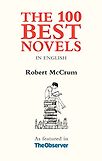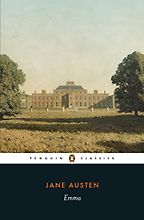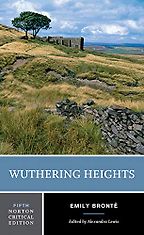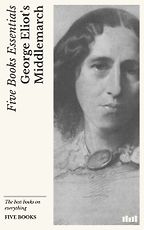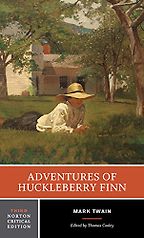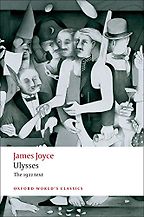You’ve just published The 100 Best Novels in English. Having spent two years thinking about this topic…what would you say is the point of a novel?
That has varied over time. If you asked that question in 1680, it would have a different answer than in 1980. Originally, for someone like John Bunyan, and Pilgrim’s Progress—which is not really a novel but more of an allegory—it was a book written almost in desperation. It’s a passionate statement about something important to the novelist and designed to move the reader. It’s very, very specific. Later on, by the middle of the eighteenth century, the point of a novel was really entertainment. It was a bourgeois form. Only over a period of time did it acquire the characteristic which it has now which is that it should be something which encourages empathy. Novels encourage readers to see different points of view within humanity. This is a very important role.
Then, after modernism, in the mid- to late twentieth century, it became about experimentation and literary rarefication. Now, once again, it’s changed. It’s come back to its eighteenth century form, and it’s more to do with the marketplace. There’s a tremendous drive, certainly among publicists, to find novels that sell. They are desperate for a book to sell.
But, on something like empathy, why turn to a novel? Why not just start talking to your neighbours?
The novel is a literary form that enables you to have a highly private communion with the text. In private, you’re free. If I talk to my neighbour, I’m going to get bogged down in social and political controversy. Also, if you’re out in society, you’re going to be subjected to social convention. The point about the novel is that you’re free in your head. It’s unpoliced. Reading really does liberate you.
Is striving for social change, for instance through satire, an important characteristic of a novel?
It’s certainly a characteristic. But other than Gulliver’s Travels, there are very few satires in the tradition. On my list, the number of satires is probably around three. Others might have satirical elements but the idea of writing a pure satire for the sake of a satire, as a novel, is comparatively restricted.
But to have social change as an aim—changing the way things are or bettering the world—is that underlying a lot of the novels you’ve chosen?
Not really. As Sam Goldwyn famously said, “If you want to send a message, use Western Union.” It’s not a great form for it. A book I didn’t include—Uncle Tom’s Cabin—was designed to change the world. But very few, actually, are written with that particular objective in mind.
What about you personally—what do you get from novels?
Obviously, there is entertainment. As a species, we’re very susceptible to good storytelling. Novels that neglect that get into trouble. This is a pretty traditional point of view. But if you were to ask me, ‘What is a classic?’ one answer is that it’s something which stays in print. And something which stays in print is, on the whole, something which speaks to the storytelling gene within ourselves.
I like the point you made in your book about availability of novels today. You can download the whole of Jane Austen and Conrad for free and take the whole of Dickens on holiday. In a way, we’re in an age where there’s no excuse not to read all the classics, wouldn’t you say?
Absolutely. But, at the same time, not every Charles Dickens is a classic. He wrote some stinkers! Jane Austen didn’t but then she wrote very few. Yes, you can take all of Trollope on holiday but you probably wouldn’t want to. What I’ve done is a lot of the work: I’ve made a selection. It evolved over a period of about two years, so it’s quite considered. You might say it’s conventional—some of it is quite conventional—but books that are conventionally successful are ones that have been proved by time.
So, people should take the hundred you’ve chosen on holiday or set themselves the goal of reading one a week for a year, say?
You’d be surprised how many people are doing that. There have been quite a few who have responded in that way…
Let’s talk a bit about each of your choices and why you’ve selected them. The first one you’ve given me is Emma.
You’ve got to have Jane Austen. She’s the first serious novelist. She is treating the novel in a way that we understand and creating an art form. I chose Emma. It would have been easier to choose Pride and Prejudice because it’s everyone’s favourite—it tops polls regularly. But if you want something a little bit more considered… It’s the most mature of the seven. I also happen to think the character of Emma is delightful and fascinating. She has all of the classic Austen heroine characteristics but, at the same time, she’s a bit more than that. She seems almost modern. You can imagine having a conversation with her on a train or a bus. You couldn’t necessarily imagine doing that with someone like Anne Elliot in Persuasion. It’s also a book that I first read when I was at school, so it’s a personal favourite. That’s the other thing we have to acknowledge: All these lists are faintly ludicrous–more than faintly. It’s bound to reflect a lot of personal bias and Emma was the first one that I ever read so it brings back happy memories.
It’s been consistently in print since it was published in 1816, which is amazing.
Yes, every single one of the books on this list has been. Some of them rather patchily. For example, a book like Tropic of Cancer just about scrapes in. It’s quite hard to find but it is in print. All the others are. Some of them have been through lots of different editions: Gulliver’s Travels has been published for children, for teenagers, as a political book and so on. It’s got many different forms and it’s endlessly being republished. The Folio Society couldn’t exist without that kind of book.
What I like about some of the female novelists you’ve chosen is the more domestic scenes they depict—there is that Jane Austen quotation how a novel should be about “three or four families in a country village.” This seems more realistic to me, closer to my own life, than capers or adventure stories like Tom Jones where people are rushing around the world, getting stuck on desert islands etc etc.
Yes I quite agree.
Is this a sexist divide?
Well, one thing that’s certainly true is that women read fiction more than men. If you ask any publisher they’ll tell you that the people that buy their books are women by ratio of two to one. You can’t really succeed in fiction if you aren’t appealing to a good chunk of women.
My only critique of Austen is that all her stories—in terms of the plotline—are about getting married. I find that a bit hard now that I am married. I feel like, ‘oh wait, all my expectations about what life was about, as formed by Jane Austen, were about getting married. What do I do next?’
Yes, they are rom-coms aren’t they? Hmm, what should you read? The Good Soldier—that’ll put you straight! Getting married is a big plotline but Austen is also about village life isn’t it? It’s about families.
Tell me a bit about book number 2. You’ve chosen Wuthering Heights by Emily Brontë, published in 1847.
So this is thirty years after the death of Jane Austen, it’s a generation on. It’s light years away. You couldn’t imagine anyone further from the world of Mr Woodhouse than Healthcliff. It’s about as far as it’s possible to get. But it’s very influential and Romantic. It fits into the Romantic movement in a way that Austen doesn’t.
By ‘Romantic’ what do you mean exactly?
It means a sensibility that celebrates being set free from convention. They’re very subtle, but every single character in Austen is—in one way or another—conventional. They pay tribute to the conventions of ordinary life. Whereas Cathy—and all of Emily Brontë’s characters—are more or less feral. That’s why we love them. It’s a different world, it’s a mad world. In some ways, Emily Brontë is more of a poet. But she has inspired many subsequent writers of fiction. You couldn’t imagine Lawrence without her, for example. You couldn’t imagine some of Hardy. It’s always said, isn’t it, that you’re either a Jane Eyre-ite or you’re a Wuthering Heights-ite—it’s one or the other.
It’s a little bit bleak about human nature isn’t it?
I think we like that don’t we? We want to have somebody investigate the bleakness of human nature. It’s not a feel-good novel. There are two options: you can either stay on the surface or you can go deep. There’s not much in between.
You’ve mostly chosen books that were written more than a century ago. Is that an important part of a novel for you, that it’s written in the past?
Yes. Also, one of the things about these books is that they all talk to each other. In a strange way, they’re connected. There’s an internal dialogue between one book and another. Sometimes it’s quite explicit: in the preface to the second edition of Jane Eyre, Charlotte Brontë acknowledges quite freely her debt to Thackeray—which is interesting, I think.
So, in a way, what you’re interested in is introducing people to the history of the novel. Somebody forwarded me an article about Emma recently, as the first novel written in the third person where you are also taken inside someone’s mind, as it were. Do you think it’s important to chart the first use of certain narrative techniques—knowing when writers started doing certain things?
Yes, it is important. It’s the same with Virginia Woolf and the stream of consciousness, as well as the rigorous use of point of view—what point of view you’re adopting—which is comparatively late. The novel is an evolving form and, at one time or other, it is different. Clearly the novel now is not what the novel was—even twenty years ago.
Tell me about Middlemarch, A Study in Provincial Life which is from 1874. What makes this a great novel?
It’s partly the sheer ambition of it. Eliot was absolutely determined to paint a serious, detailed picture of provincial life. The other radical thing was to do it from the point of view of a disappointed woman. Dorothea is a very enthralling portrait.
What else is Eliot trying to do? Is it a social critique? Was she trying to warn people not to marry the wrong person?
It’s not that explicit. It’s more about the choices that you might make as a woman—or indeed as a man.
Is it about what it is to be a good person?
Yes. That’s another element of the book, that it has a very strong moral core. This is why someone like F. R. Leavis chose it in The Great Tradition. That’s a new development. Until Eliot’s time, the primary consideration was to be entertaining. Virginia Woolf famously said Middlemarch was “one of the few English novels written for grown-up people.” I think that’s quite a good description actually. It’s also an amazing portrait of a moment, like a cathedral. It’s vast and seems to extend in every direction when you’re in it.
Let’s go on to book number 4 on your list: Huckleberry Finn. Now, this is your only choice from the United States.
Yes, I think we have to have it. Hemingway said that all American fiction comes from Huckleberry Finn. That’s true, in the sense that Twain invented a way of looking at the American experience and putting it into fiction. I think almost every American writer has to acknowledge that. He is for Americans as important as Chaucer might be for us. He’s a pioneer and shapes the terms of trade of American fiction writing for a long time. He was able to turn the American vernacular into literature.
Still, it does strike me as a bit of a caper or adventure story: camping in the woods, going on a raft down the river etc. Is that how you find it or not?
Well, it’s partly a sequel to Tom Sawyer which was a story for boys, so yes. But, at the same time, it’s also about race which is a very important question. It’s about the American frontier, which is also a very important: you can’t imagine a book like Kerouac’s On the Road or a lot of Hemingway without it. It’s a very important dimension in American life, the frontier, and Twain nails it completely.
For me, it’s very nice to read and it’s funny but it’s also a slice of history, an insight into that particular period before the Civil War. Was he an accurate portrayer of what the South was like? Is he describing his personal experience?
Yes, he’s drawing on his life on the Mississippi. If you read his Life on the Mississippi, you find a portrait of life on the river which feels like outtakes from the novel, in a way. Huckleberry Finn is written in at least two—if not three—parts and begins in fairly high spirits and gets darker and darker. It was written over quite a long period. Its darkness, in some ways, is quite unsatisfactory from a narrative point of view because it becomes very bleak. You talked about bleakness: he was very, very bleak.
And it’s always been controversial—even now.
Yes, in America there are periodic attempts to get it banned by various mad, bigoted high schools.
Your final book, number five, is Ulysses—published in 1922.
Interestingly, that’s the same year as The Waste Land. You get these two modernist masterpieces in the same year—one at the beginning of the year, one at the end. One barely fifteen pages—one closer to a thousand pages. It’s like the North and the South Pole.
What is a modernist novel?
It’s a novel published after about 1910. It’s a novel that takes the traditional elements of place and time and mashes them up and reorders them. It attempts to capture the flow of human thought and human experience on the page in words and has no apparent interest in the conventions of the Victorian novel. It’s trying to represent the ordinary world in prose. Ulysses is a very brilliant, highly original attempt to put one man’s experience on one day to the pages of a book.
In your book, you point out that it has been said that ‘English-language fiction since 1922 has been a series of footnotes to James Joyce’s masterpiece.’
That’s certainly true about a lot of novels. I was reading this year’s Booker Prize shortlist and every one of those feels like a footnote. They’re just so trivial—each doing one thing that Joyce is probably doing a hundred times more brilliantly and in more different ways on any given page of Ulysses.
Get the weekly Five Books newsletter
It’s quite hard to understand, though. When I tried to read it age 20, my then boyfriend’s mother said the only way to read it was with a guide which would explain what was going on. At which point I gave up. I liked your suggestion, though that Ulysses is not that hard to read if you listen to a good audiobook version…
Listening to it is a good way because you hear it differently. Also because Joyce’s ear for the music of language is so extraordinary. I recommend it very highly.
But if you want to understand it straight-off, do you need to read A Portrait of the Artist as a Young Man first?
It helps, yes. The more you know about Joyce the more you understand and Ulysses certainly repays close attention and study. But you don’t need to bother with Finnegan’s Wake. I don’t think anyone has ever managed to read all the way though Finnegans Wake, it’s almost impossible.
What is Ulysses about?
It’s about Leopold Bloom’s day in Dublin. It’s about the trials of a middle-aged man, essentially, flashing backwards and forwards in time. It’s about his relationship to his wife. It’s also a portrait of a man in a place: a portrait of a man in Dublin—a Dublin that you can’t find anymore because it’s been so modernised. It used to be quite easy to find Joyce’s Dublin, it was quite available, but it has disappeared, I’m afraid.
Is there some cachet attached to novels if they’re harder to understand? Is that part of the definition of a novel—as opposed to a trashy read—that you have to work at it?
Not necessarily. There are some books which do make that demand and are taken more seriously because they make that demand. But it’s not a cast-iron rule. There are plenty of Dickenses which are a romp. I think some of the trouble we’ve got into in the near past was the idea that the more difficult it was the better it was.
Five Books aims to keep its book recommendations and interviews up to date. If you are the interviewee and would like to update your choice of books (or even just what you say about them) please email us at [email protected]
Five Books interviews are expensive to produce. If you've enjoyed this interview, please support us by donating a small amount.

